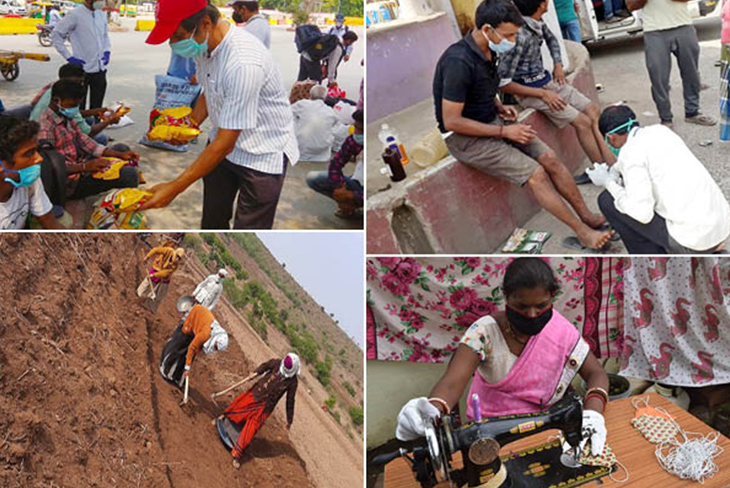People dependent on the informal economy have been the hardest hit by the impact of the COVID-19 pandemic. The outbreak hugely disrupted the lives of the workers who had migrated from their villages to cities searching for work. Dealing with the loss of livelihoods in the towns amid the pandemic-induced socio-economic distress, lakhs of migrant workers had no other option but to head back to their native places. Our teams enabled their safe return home and ran ‘Relief in Transit’ hubs on highways and roads across ten states of the country, providing migrants on the road with water, food, footwear and first aid during their arduous journeys. Together with local administrations, our volunteers and allies also helped counsel the returnee migrant workers on the need to maintain quarantine, besides helping set up community-based quarantine facilities. To ascertain the status of quarantine infrastructure and services, especially concerning the needs of women and children, we also carried out an assessment covering 765 quarantine centres across 14 states. The findings and recommendations would help authorities strengthen the related infrastructure and build a more gender-responsive policy framework.
In light of the enormous reverse migration, a significant task at hand was to enable the returnee migrant workers to earn a living in their villages. In rural areas, the Mahatma Gandhi National Rural Employment Guarantee Act (MGNREGA) is a significant source of livelihood for communities. Together with our allies and volunteers across states, we have been facilitating and ensuring work for community members under MGNREGA, besides planning collective livelihoods and enterprises. You can read more about our livelihood regeneration efforts here.
To assess the pandemic’s impact on the human rights of people, especially the marginalized sections, the National Human Rights Commission (NHRC) had set up an Expert Committee. Sandeep Chachra, Executive Director, ActionAid Association, was invited to be on the committee to develop recommendations for protecting informal workers’ rights for the NHRC and the relevant institutions of the Union and State Governments. Sandeep submitted advisories to NHRC dealing with the multiple vulnerabilities of informal workers and the support required by them. Developed together with several workers’ formations, social organizations, experts and informal workers themselves, these advisories covered specific recommendations on employment generation, wages, safe and dignified working conditions, and social security for all workers.
Additionally, to assess the impact of COVID-19 and the subsequent lockdown on informal workers, we are conducting a multi-round longitudinal study across states, covering a range of issues regarding the status of their livelihoods and wages, savings and expenditure, and access to social security schemes and other entitlements. You can find the highlights from Round 1 of the survey here and Round 2 here. We hope that this study would help formulate a strategy to support informal workers in accessing relief, rebuilding their lives and livelihoods, and asserting their rights.

